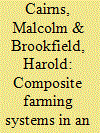| Srl | Item |
| 1 |
ID:
103961


|
|
|
|
|
| Publication |
2011.
|
| Summary/Abstract |
Composite farming systems, first clearly identified by Rambo, are those in which radically different technologies are found together in a single farming complex. Data from diaries kept by groups of farming families in two Angami Naga villages in northeast India, Khonoma and smaller Tsiesema, detailing inputs into and outputs from wet-rice terraces and jhum (swidden) fields in the years 2000 and 2001, are presented and discussed to detail the workings of related but different composite systems. The 2000-2001 survey caught an important set of changes in midstream. Although returns to labour from the first-year jhums were much higher than those from the wet-rice terraces in 2000-2001, jhums were declining in significance as a growing non-farm economy joined the production of cool-climate vegetables and a spice crop for the Indian market as principal sources of livelihood. This story is told in the light of recent writing on the demise of swidden in the larger Southeast Asian region, and it is suggested that greater attention be paid to the composite systems, which are not uncommon in this region. This might help diversify what has perhaps been an oversimplified discussion.
|
|
|
|
|
|
|
|
|
|
|
|
|
|
|
|
| 2 |
ID:
147463


|
|
|
|
|
| Summary/Abstract |
This paper analyses how rural households engage in different segments of non-farm wage labour markets using panel data from three Vietnamese provinces that also include perceived reasons for obtaining employment. We show that it is important to appreciate the heterogeneous nature of rural non-farm wage employment from a livelihood perspective. Different jobs vary in terms of seasonality, earning potential, social insurances, location and entrance requirements. Most notably, public service jobs are most favourable from a livelihood perspective. Regarding factors influencing participation, education has a positive effect on engagement in public and private service jobs, a negative effect on participation in construction jobs and no significant effect on employment in industry jobs. Further, family contacts are crucial in the process of finding non-farm employment in all sectors. The disaggregated approach allows a better conceptualisation and can lead to better targeted policy recommendations.
|
|
|
|
|
|
|
|
|
|
|
|
|
|
|
|